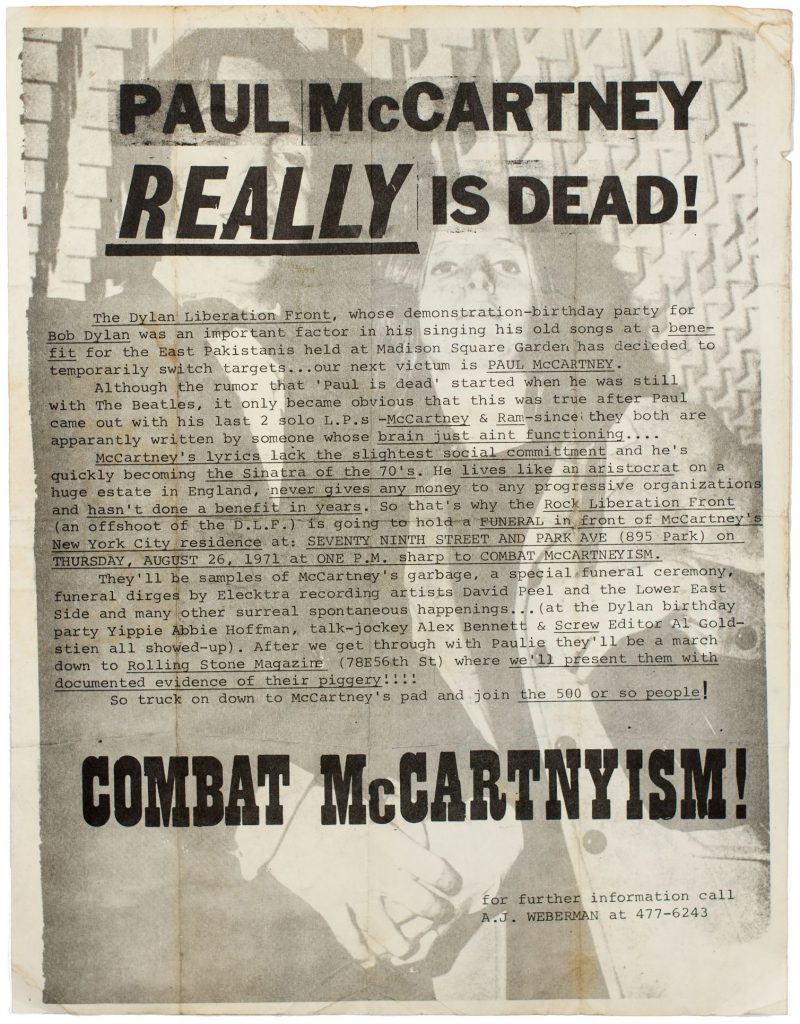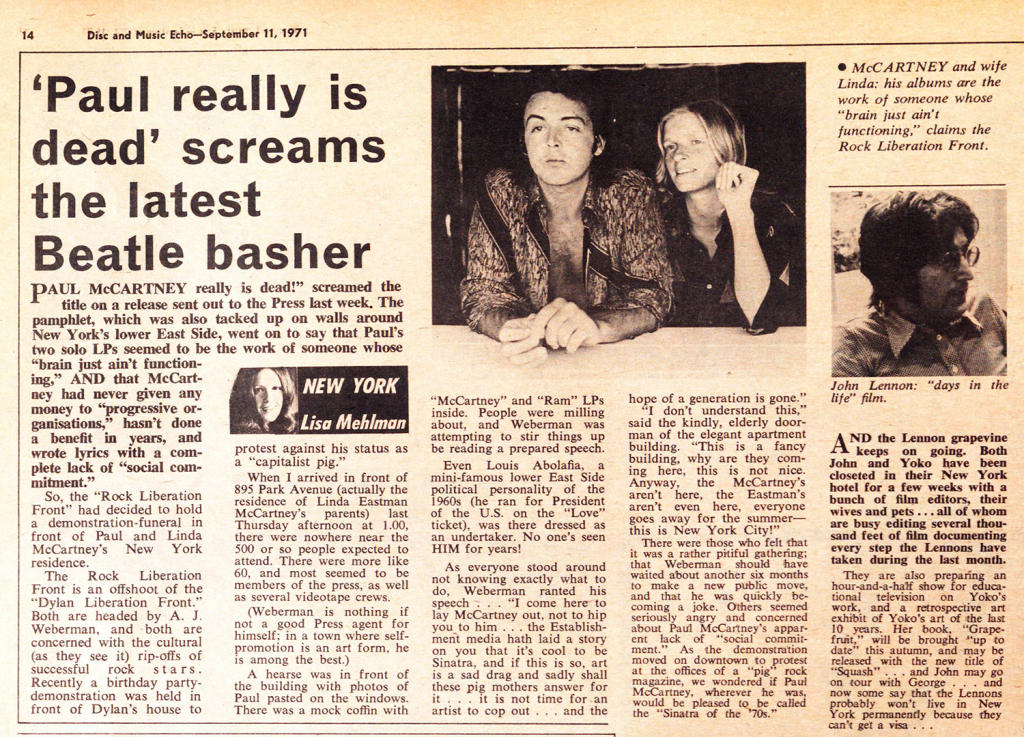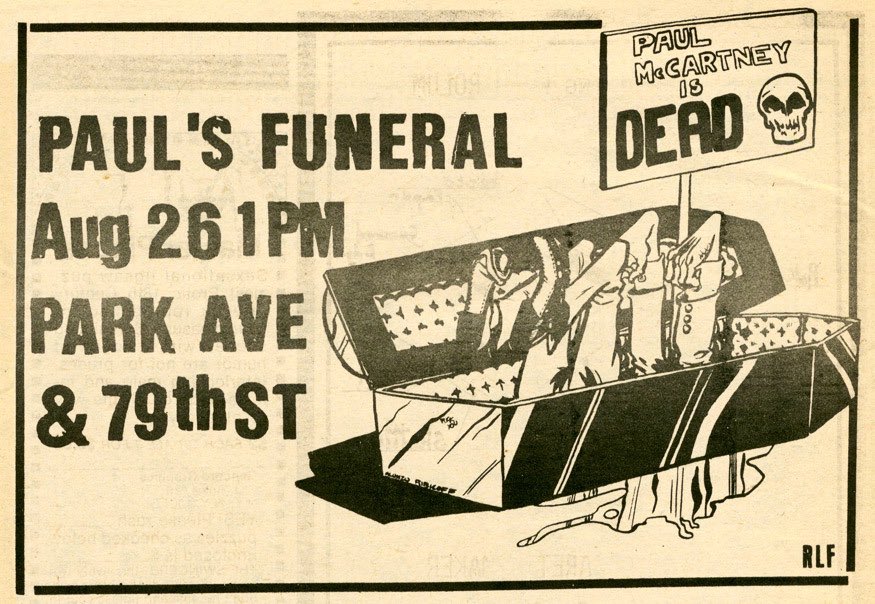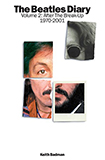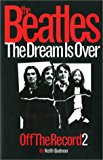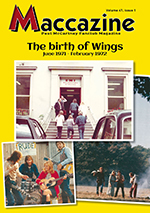Timeline
Article Aug 21, 1971 • Paul McCartney back from Ireland
Interview Aug 21, 1971 • George Martin interview for Melody Maker
Article Aug 26, 1971 • The Rock Liberation Front organize a mock funeral for Paul McCartney
Article Sep 06, 1971 • Paul McCartney meets Richard Hewson to discuss "Dear Friend"
Article Sep 09, 1971 • John Lennon's "Imagine" album released, with references to "Ram"
From Wikipedia:
Alan Jules Weberman (born May 26, 1945) is an American writer, political activist, gadfly, and inventor of the terms “garbology” and “Dylanology”. He is best known for his controversial opinions on, and personal interactions with, the musician Bob Dylan. Together with New York folk singer David Peel, Weberman founded the Rock Liberation Front in 1971 with the aim of “liberating” artists from bourgeois tendencies and ensuring that rock musicians continued to engage with and represent the counterculture of the 1960s. […]
Bob Dylan
Weberman has written on the life and works of Bob Dylan, including a pamphlet titled Dylanology in 1969 and creating a word concordance of Dylan’s lyrics. He also wrote the Dylan to English Dictionary, published in 2005. One of Weberman’s theories on Dylan’s songwriting is that some of Dylan’s songs are actually about, or addressed to, Weberman himself. Authors Bob Spitz and Jim Curtis have each rejected, and ridiculed, Weberman’s interpretations of Dylan’s work.
In 1969, Weberman founded the “Dylan Liberation Front” with associates such as street musician David Peel, aiming “to help save Bob Dylan from himself”. Weberman was convinced that, from Dylan’s docile, smiling visage on the cover of his 1969 album Nashville Skyline, the singer was hiding from his social conscience and ignoring his responsibilities as a political spokesman for the counterculture. Once Dylan had moved back to Greenwich Village from Upstate New York in 1970, Weberman took to rifling through his garbage. That same year, Weberman began lecturing in Dylanology at the left-wing Alternate University of New York. At this time, the Liberation Front lamented that Dylan had become a “reactionary force in rock”, a view that was echoed among the radical left.
Rolling Stone magazine called Weberman “the king of all Dylan nuts”; he has also been described as obsessively stalking Dylan. In late summer 1971, Dylan – annoyed that Weberman had reneged on their agreement that he would no longer dig through his garbage – assaulted Weberman on Elizabeth Street in Manhattan. In a 1997 article, Rolling Stone reported that Weberman, “a man that terrorized Bob Dylan during the ’60s”, had now “returned to hassle his son”, Jakob Dylan. Weberman claimed that the younger Dylan was a heroin addict. In 1977, Weberman’s telephone conversations with Dylan from the early 1970s were released on the Folkways Records album Bob Dylan vs A.J. Weberman – The Historic Confrontation.
Writing in 2014 about the phenomenon of “Bob Dylan obsessives”, John Dickerson of Slate described Weberman as “The most famous of the Dylanologists”. In December 2016, after Dylan received the Nobel Prize in Literature, Weberman released a video on YouTube in which he claimed credit for Dylan’s achievement. Journalist John Semley, writing for Salon, views Weberman’s claim as far-fetched yet also identifies “a scrap of truth in it”. He recognises the garbologist as furthering a “philosophical and anthropological tradition” observed by French poet Charles Baudelaire, in the latter’s celebration of the city chiffonier (or rag-picker), and practiced in the work of German philosopher Walter Benjamin. Semley concludes: “Maybe an artist of Bob Dylan’s magnitude requires a worthy bête noire like Alan Weberman, a guy who’s equal parts pariah, arch enemy, early model internet troll, modern-day chiffonnier; a manic, moonstruck, single-minded goon who pours heart, soul, and sanity into his stupendous schemes.”
Rock Liberation Front
Weberman and the Dylan Liberation Front ceased their scrutiny of Dylan, temporarily, after he performed at George Harrison’s Concert for Bangladesh shows at Madison Square Garden on August 1, 1971. Weberman was satisfied with Dylan’s reversion to his 1960s protest singer persona and his scruffy attire at the concerts. Together with Peel, he formed the Rock Liberation Front (RLF) to “establish a relationship of understanding and participation in the World of Rock”, which had “been getting ripped off too long”. They first targeted Paul McCartney, whose recent music showed he was “just a businessman” and “a good example of the capitalist, non-involved egotistical rock star”, according to Weberman. The RLF held a mock funeral for McCartney, on August 26, outside the Park Avenue home of his lawyer and father-in-law, Lee Eastman. Reporting on the event a week later in The Village Voice, Blair Sabol opined that Weberman’s strategy was becoming overfamiliar: “Being the foremost Dylanologist, or garbageologist, was brilliant for last year’s routine, but revamping it for Paul McCartney as this year’s ‘capitalist pig’ campaign is like giving an encore after the audience has gone home.” The RLF also protested against Led Zeppelin for demanding $75,000 per concert performance.
Weberman’s idealism resonated with John Lennon, who had recently moved to Greenwich Village with his artist wife, Yoko Ono, and embarked on a radical left agenda under the guidance of activist Jerry Rubin. Lennon espoused Weberman’s principles in his interactions with the music press, stating that he was dedicated to making politically motivated music without a thought for commercial gain. In early December, the RLF demonstrated outside Capitol Records, protesting the company’s delay in releasing the live album from the Concert for Bangladesh after Harrison had accused Capitol of refusing to distribute the record at cost price. During the protest, Weberman announced that Lennon and Ono had joined the Liberation Front, which he defined as “a group dedicated to exposing hip capitalist counterculture ripoffs and politicizing rock music and rock artists”.
Through Lennon, Rubin came to be involved with the RLF, and soon sidelined Weberman. In his speech at the freedom rally for the imprisoned poet and activist John Sinclair, on December 10, 1971, where Lennon, Ono and Peel were among the performers, Rubin described the event as “the first act of the Rock Liberation Front”.
Lennon, Ono and Rubin also planned a US tour that would use their political message to unite the nation’s young voters and thwart President Nixon’s campaign for re-election in 1972. Lennon and Rubin were intent on enlisting Dylan for the tour and so issued an open letter on behalf of the RLF, demanding that Weberman publicly apologize to Dylan for the print and radio campaign he had waged against the singer and for describing him as a junkie. Published in The Village Voice, the letter also stated that all those in the movement should “[save] our anger for the true enemy, whose ignorance and greed destroys our planet”, and led to the RLF becoming an organization of interest to the FBI. Author Peter Doggett likens this demand to a forced confession in “Stalin’s Russia”, since Rubin had openly supported the underground publications that ran Weberman’s stories, and Weberman had been among the first to accept Dylan’s post-Bangladesh single, “George Jackson”, as a worthy return to the protest style. Weberman nevertheless issued an apology “for past untrue statements and also the harassment of Bob Dylan and his family”, and signed it: “A.J. Weberman, Minister of Defence, Rock Liberation Front”.
Weberman regained his leadership of the RLF in February 1972, when the group “liberated” the offices of Lennon and Harrison’s business manager, Allen Klein, at 1700 Broadway. The event was a press conference in which Klein attempted to respond to allegations made in New York magazine, and partly supported in Rolling Stone, that he had pocketed funds intended for the Bangladeshi refugees from the sale of the Concert for Bangladesh album. Chanting “You’ll wonder where the money went, when Klein runs a charity event”, the protestors disrupted the press conference and gained further exposure for Klein’s alleged fraud in Variety, Rolling Stone and The Village Voice. Surprisingly for Weberman, this resulted in an invitation from Lennon and Ono for him to visit them at their Bank Street apartment, where the couple confided that Klein was “ripping us off too”. According to Weberman, he introduced Lennon to a group of sympathizers and financiers for the IRA, to whom Lennon made a generous financial contribution.
Lennon’s direct role in political activism soon waned, although he continued to finance activities by Weberman and Peel. The latter recorded an album, The Pope Smokes Dope, which was produced by Lennon and Ono, and released on Apple Records in April 1972. Lennon also donated $50,000 to pay for demonstrators’ travel expenses to Miami, Florida, where Weberman helped to stage a mass protest against Nixon at the Republican National Convention in August. […]
The Paul is dead rumors were running rampant globally during the endgame of the Beatles. We gather that a lot of LSD and amphetamines were consumed during these times, and that meaningful conspiratorial truths could be deciphered from a seemingly mundane record cover or publicity still. AJ Weberman is generally considered the most nutso of the Dylan scholars and will be remembered for the ages as the guy who went through Bob Dylan’s garbage and wrote a book about it. Weberman probably did not go through Paul McCartney’s garbage as this text assumes his artistic death, and hence that the garbage has no merit.
From Paul McCartney REALLY Is Dead | A J. Weberman (boo-hooray.com)
PAUL McCARTNEY REALLY IS DEAD!
The Dylan Liberation Front, whose demonstration-birthday party for Bob Dylan was an important factor in his singing his old songs at a benefit for the East Pakistanis held at Madison Square Garden has decided to temporarily switch targets… Our next victim is PAUL MCCARTNEY.
Although the rumor that ‘Paul is dead’ started when he was still with The Beatles, it only became obvious that this was true after Paul came out with his last 2 solo L. P. s -McCartney & Ram – since they both are apparently written by someone whose brain just ain’t functioning…
McCartney’s lyrics lack the slightest social commitment and he’s quickly becoming the Sinatra of the 70’s. He lives like an aristocrat on a huge estate in England, never gives any money to any progressive organizations and hasn’t done a benefit in years. So that’s why the Rock Liberation Front (an offshoot of the D.L.F) is going to hold a FUNERAL in front of McCartney’s New York City residence at: SEVENTY NINTH STREET AND PARK AVE (895 Park) on THURSDAY, AUGUST 26, 1971 at ONE P.M. sharp to COMBAT MCCARTNEYISM.
They’ll be samples of McCartney’s garbage, a special funeral ceremony, funeral dirges by Elecktra recording artists David Peel and the Lower East Side and many other surreal spontaneous happenings… (at the Dylan birthday party Yippie Abbie Hoffman, talk-jockey Alex Bennett & Screw Editor Al Goldstien all showed-up) . After we get through with Paulie they’ll be a march down to Rolling Stone magazine (78E56th St) where we’ll present them with documented evidence of their piggery!!!
So truck on down to McCartney’s pad and the 500 or so people!
COMBAT McCARTNYISM!
for further information call A.J. WEBERMAN at 477-6243
From Paul McCartney REALLY Is Dead | A J. Weberman (boo-hooray.com)
